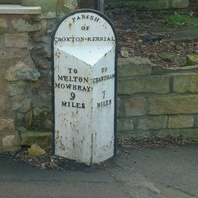
Viking Names
Croxton Kerrial
The first element of Croxton Kerrial, in the Framland Hundred of Leicestershire, likely comes from the Old Danish male personal name Krōk (Old Norse Krókr), originally a byname meaning ‘crooked-back’, possibly ‘crooked-dealer’ related to Old Norse krókr ‘hook’. Alternatively the first element could be Old English crōc ‘a crook’, which relates to a location situated in a nook or bend of land. The second element is Old English tun ‘an enclosure; a farmstead; a village; an estate’. The land was granted to granted to Bertramus de Cryoll in 1239 thus the affix Kerrial. This name can be compared to South Croxton also in Leicestershire.
Read More
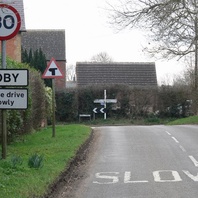
Viking Names
Hoby
Hoby, in the East Goscote Hundred of Leicestershire, is an Anglo-Scandinavian hybrid name from Old English hoh ‘a heel; a sharply projecting piece of ground’ and Old Norse by ‘A farmstead, a village’. The name is topographically appropriate because the present village sits at the foot of a great spur of land which abuts the River Wreake. Hoby is now a joint parish with Rotherby.
Read More

Viking Names
Snibston
Snibston, in the West Goscote Hundred of Leicestershire, is a hybrid place-name formed from the Old Norse male personal name Snípr, a byname related to Norwegian snipa ‘a miser, an unsociable person’ and Old English tun ‘farm, settlement’. Snibston became a joint parish with Ravenstone in 1884 when Ravenstone moved from Derbyshire to Leicestershire.
Read More
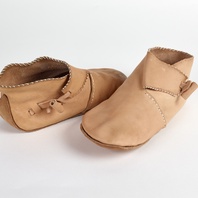
Viking Objects
Reproduction Shoes
A pair of leather turnshoes based on examples found at Coppergate, York. The shoes are vegetable tanned and fastened by a toggle on the side.
Read More
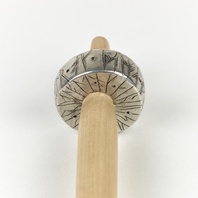
Viking Objects
Reproduction Drop Spindle
A reproduction of a lead alloy spindle whorl with a runic inscription, modelled on a find from Saltfleetby St Clement, Lincolnshire. Fibres were spun into thread using a drop-spindle of which the whorls were made of bone, ceramic, lead, or stone and acted as flywheels during spinning.
Read More
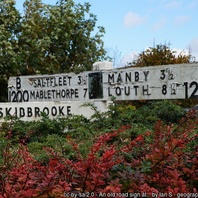
Viking Names
Saltfleetby
Saltfleetby, in the Louth Eske Wapentake of Lincolnshire, comes from the stream-name Saltfleet (Old English salt and flēot) and the Old Norse element by ‘farm, settlement’, referring to the latter’s location. There are actually three Saltfleetbys, now identified by the dedications of their parish churches, Saltfleetby All Saints, Saltfleetby St Clement, and Saltfleetby St Peter.
Read More

Viking Names
Roston
Roston, in the Appletree Hundred of Derbyshire, comes from the Old Norse male personal name Hrosskell and the Old English element tun ‘farm, settlement’. It is thus a hybrid name. Roston is a joint parish with Norbury.
Read More
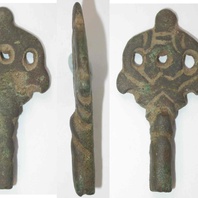
Viking Objects
Decorated Key (DENO-4259B3)
This cast copper-alloy key handle is decorated with Scandinavian-influenced designs reminiscent of the Urnes style of Viking art. Keys were not only practical items but also symbols of status. Women often carried the keys to the family’s chests of valuables. They also are often buried with keys, representing their authority in the household. See also the blog post on keys in the Viking Age.
Read More
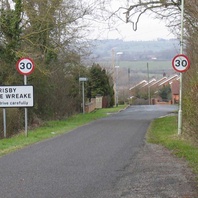
Viking Names
Frisby on the Wreake
Frisby on the Wreake, in the East Goscote Hundred of Leicestershire, takes its name from a Scandinavian form of an ethnonym Frisa (gen. pl.) ‘Frisians’ and the Old Norse element by ‘farmstead, village’. The affix ‘on the Wreake’ was added at a later date to distinguish this Frisby from another in the Gartree Hundred of Leicestershire and refers to the site’s location on the river, adjacent to Kirby Bellars. Traditionally, the place-name has been interpreted as referring to Frisians who took part in the Viking invasions. However, the exact implications of such a name are not yet fully understood and are the subject of ongoing work by Dr Jayne Carroll of the Institute for Name-Studies, University of Nottingham.
Read More
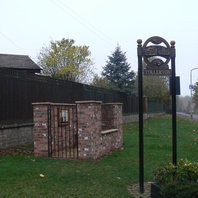
Viking Names
Tollerton
The place-name of Tollerton, in the Bingham Wapentake of Nottinghamshire, has suffered a good deal of corruption. Twelfth-century spellings of the name point to the Old Norse male personal name Þórleifr as the first element. Later there seems to have been confusion with another Old Norse male personal name, Þórleikr. The second element is Old English tun ‘an enclosure; a farmstead; a village; an estate’, making it a hybrid name.
